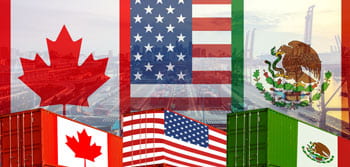Jeff Falk
713-348-6775
jfalk@rice.edu
Labor rights, environment protections strengthened under new North American trade deal, says Baker Institute expert
HOUSTON – (June 18, 2019) – Improved labor and environmental provisions are among the most significant changes in the United States-Mexico-Canada Agreement (USMCA) compared to its predecessor, the North American Free Trade Agreement (NAFTA), according to a report from the Mexico Center at Rice University’s Baker Institute for Public Policy.
“The U.S.-Mexico-Canada Agreement: Labor Rights and Environmental Protection,” authored by David Gantz, the Will Clayton Fellow in Trade and International Economics at the Baker Institute, reviews the evolution of labor and environmental rights in U.S. free trade agreements and evaluates such provisions in the USMCA.
The USMCA has been signed but not yet ratified by the three countries.
“In the labor area, the most significant addition is the USMCA annex requiring Mexico to enact new labor legislation designed to facilitate the formation of independent unions and effective collective bargaining in Mexico for the first time in history,” wrote Gantz, who is also the Samuel M. Fegtly Professor of Law at the University of Arizona’s James E. Rogers College of Law and director emeritus of its international trade and business law program.
“If the new legislation is enforced by Mexico, with or without pressure from the United States, it can be expected to bring about significant changes to labor in Mexico,” he wrote.
Due to the weakness of NAFTA’s labor provisions and many subsequent labor chapters in U.S. trade agreements, Democratic members of Congress have suggested that better enforcement mechanisms are needed to ensure that Mexico’s government complies with the improved labor laws, Gantz said.
“The Democratic Party has indicated that such mechanisms are required if the USMCA is to receive their support,” he wrote. “Such improved enforcement mechanisms, according to one leading House Democrat, might be addressed as part of the legislation to implement the USMCA, which wouldn’t require reopening the agreement.”
However, House Speaker Nancy Pelosi has argued that these enforcement issues cannot effectively be addressed in implementing legislation and will instead require renegotiating the USMCA, Gantz said. “Presumably, the Democratic Party’s concerns could more easily be resolved through an appropriate side letter that could be considered part of the overall agreement in conjunction with the numerous other side letters,” he wrote.
The environmental provisions are less radical, for the most part, since they incorporate many innovations negotiated in the Trans-Pacific Partnership (TPP), such as coverage of wildlife trafficking, illegal logging, illegal fishing, fisheries subsidies and marine pollution, Gantz said.
“However, these provisions exceed the level of environmental protection under NAFTA and the North American Agreement on Environmental Cooperation,” he wrote. “Significantly, the USMCA, unlike the TPP, incorporates the Council on Environmental Cooperation, its secretariat and its advisory committee, along with the procedures permitting citizen complaints.”
Gantz said the USMCA environmental advisory committee was, however, disappointed with the environmental chapter’s failure to address climate change and global warming, particularly in the lack of “provisions that incentivize trade and investment in areas like infrastructure investment and support for renewable energy supplies that promote constructive climate policies,” as the committee wrote in its report to the U.S. trade representative.
Gantz concluded, “If the USMCA is approved by the three governments and enters into force, it will also provide mechanisms for improving the status of labor rights and levels of environmental protection in North America.”
-30-
For more information or to schedule an interview with Gantz, contact Jeff Falk, associate director of national media relations at Rice, at jfalk@rice.edu or 713-348-6775.
Related materials:
Report: www.bakerinstitute.org/research/protecting-labor-rights-and-environment-under-usmca
Gantz bio: www.bakerinstitute.org/experts/david-a-gantz
Follow the Baker Institute via Twitter @BakerInstitute.
Follow the Baker Institute Mexico Center via Twitter @BakerMexicoCtr.
Follow Rice News and Media Relations via Twitter @RiceUNews.
Founded in 1993, Rice University’s Baker Institute ranks among the top three university-affiliated think tanks in the world. As a premier nonpartisan think tank, the institute conducts research on domestic and foreign policy issues with the goal of bridging the gap between the theory and practice of public policy. The institute’s strong track record of achievement reflects the work of its endowed fellows, Rice University faculty scholars and staff, coupled with its outreach to the Rice student body through fellow-taught classes — including a public policy course — and student leadership and internship programs. Learn more about the institute at www.bakerinstitute.org or on the institute’s blog, http://blog.bakerinstitute.org.


